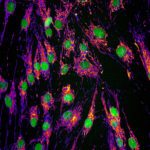Lien vers Pubmed [PMID] – 36417180
Lien DOI – 10.1093/brain/awac444
Brain 2023 Mar; 146(3): 858-864
Pyruvate is an essential metabolite produced by glycolysis in the cytosol and must be transported across the inner mitochondrial membrane into the mitochondrial matrix, where it is oxidized to fuel mitochondrial respiration. Pyruvate import is performed by the mitochondrial pyruvate carrier (MPC), a hetero-oligomeric complex composed by interdependent subunits MPC1 and MPC2. Pathogenic variants in the MPC1 gene disrupt mitochondrial pyruvate uptake and oxidation and cause autosomal-recessive early-onset neurological dysfunction in humans. The present work describes the first pathogenic variants in MPC2 associated with human disease in four patients from two unrelated families. In the first family, patients presented with antenatal developmental abnormalities and harboured a homozygous c.148T>C (p.Trp50Arg) variant. In the second family, patients that presented with infantile encephalopathy carried a missense c.2T>G (p.Met1?) variant disrupting the initiation codon. Patient-derived skin fibroblasts exhibit decreased pyruvate-driven oxygen consumption rates with normal activities of the pyruvate dehydrogenase complex and mitochondrial respiratory chain and no defects in mitochondrial content or morphology. Re-expression of wild-type MPC2 restored pyruvate-dependent respiration rates in patient-derived fibroblasts. The discovery of pathogenic variants in MPC2 therefore broadens the clinical and genetic landscape associated with inborn errors in pyruvate metabolism.


